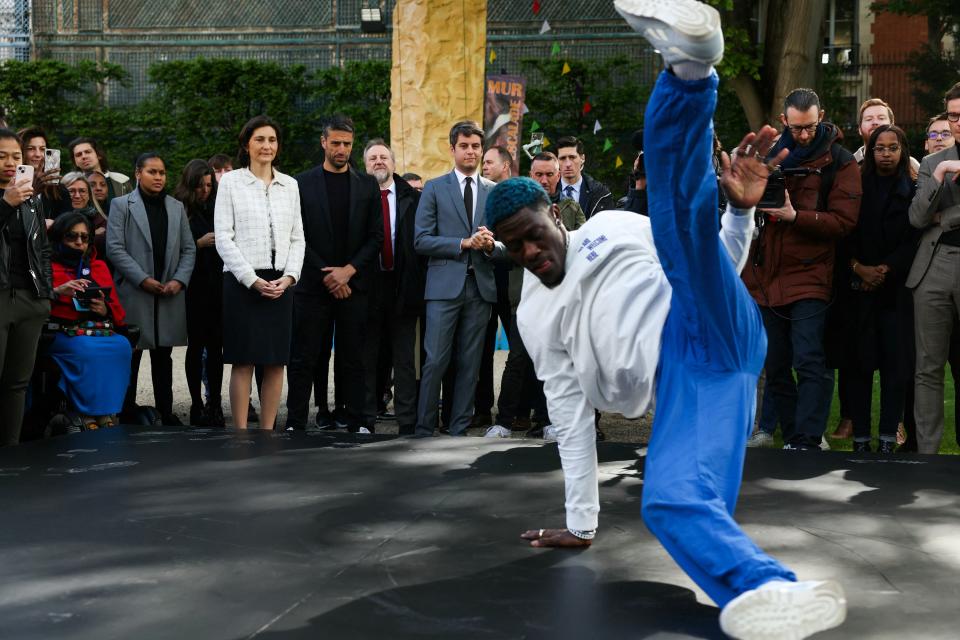Breakdancing to make its Olympics debut in Paris this summer

Breakdancing has come a long way from its beginnings on the street corners of the South Bronx more than half a century ago. Now enshrined as one of the four foundational elements of hip-hop, breakdancing is not only an established art form but is poised to debut on the world's biggest athletic stage: the Olympics.
This summer in Paris, 16 B-Boys and 16 B-Girls will "face off in spectacular solo battles" in the games' first-ever breakdancing competition, in which athletes will "use a combination of power moves — including windmills, the 6-step, and freezes — as they adapt their style and improvise to the beat of the DJ's tracks," the Olympics said. The addition of breakdancing comes after the sport's "outstanding success" during a trial run at the 2018 Summer Youth Olympic Games in Buenos Aires. Officially designated as "breaking," this will be the first dance-sport included in the Olympic Games, said Team USA, and is set to debut with both fanfare and controversy. With less than three months to go before the torch is lit in Paris and the games commence, here's why everyone is buzzing about Olympic breaking.
A sport 'light-years ahead of what it was'
Along with skateboarding, surfing, and sport climbing — all three of which debuted in the 2020 Tokyo summer games — breaking represents an "attempt by the International Olympic Committee to reach a younger audience," NBC said. Inclusion in the games offers a "chance for us to grow and educate people on breaking," Team USA member Jeffrey Louis, known professionally as B-Boy Jeffro, said to the outlet. Olympic success means creating "something unstoppable" for the sport, Jeffro said, particularly since "the first time breaking blew up, it fizzled out" after gaining popularity in the 1980s.
For many, the aesthetic of boomboxes and flattened cardboard boxes from the late 20th century is still "associated with breakdance today, four decades later," Forbes said. In reality, however, breaking as an "art form and culture have evolved significantly, so the world has plenty of catching up to do." The sport is now "light years ahead of what it was in the '80s," with "177 competitors from 62 different nations" competing at last year's international championship sponsored by the World DanceSport Federation (WDSF), the global governing body for breakdancing. That organization "traces its roots to 1909, when the first unofficial ballroom championships occurred in Paris," and had "first wanted to enter the Olympic movement through ballroom dance," The Athletic said. It was not until the 2016 Olympics in Rio that then-WDSF CEO Jean-Laurent Bourquin proposed introducing several other dance-sport entries — including breaking — as a way for the International Olympic Committee to "reconnect with the youth, the generation between 15 and 25 years old."
'Inevitable questions'
While breaking's Olympics debut has been celebrated as a mutually beneficial development for both the sport and the games themselves, not every response has been so positive. Calling it a "mockery" of the institution, Australian squash champion Michelle Martin lamented breaking's inclusion after it was announced in 2020, saying "the Olympics was all about a score, or it was a running race" with a definitive winner. Without that, Martin predicted, "it just gets so corrupt and so out of control."
The question of how to score what has in the past been a "very subjective" competition has lead to the creation of a Trivium system for the Olympics, which digitally "allows judges to react in real time to breakers' physical, artistic and interpretative qualities — their 'body, mind and soul,'" The Associated Press said. The "inevitable questions" about breaking's subjectivity are "not drastically more than in established Olympic sports like gymnastics, synchronized swimming or figure skating," Northumbria University Sport, Exercise and Rehabilitation professor Mikhail Batuev said in The Conversation.
Ultimately, one of the most significant impacts of Olympic breaking may be that it will lead to "more financial opportunities" within the sport, Team USA member Sunny Choi said. And with more money, there will inevitably be "more people looking at breaking, more people wanting to put their kids into schools."
Meanwhile, team USA is a "front-runner" for gold this summer, group spokesperson Tyquan Hodac told NBC. "We're the powerhouse. Every other country is looking up to us."

